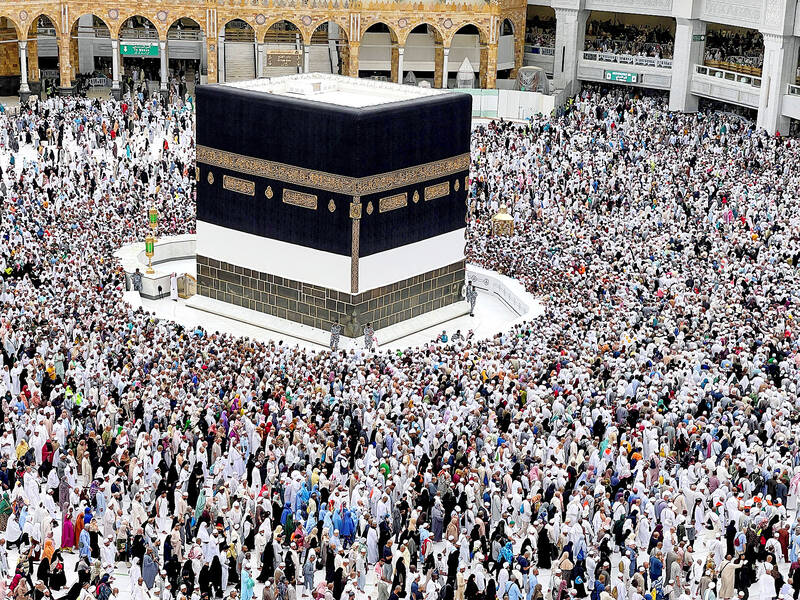People traveling to Mecca for the hajj next month should visit a travel medicine clinic two to four weeks before their departure, the Centers for Disease Control (CDC) said yesterday.
The hajj, an annual Islamic pilgrimage to Mecca, Saudi Arabia, is expected to take place from June 14, and as millions are expected to take part, travelers risk contracting diseases, the CDC said.
Travelers are recommended to consult with a travel medicine specialist two to four weeks before their departure to receive vaccine and disease prevention advice based on their itinerary and specific needs, it said.

Photo: Reuters
People arriving in Saudi Arabia for the hajj are required to submit a valid vaccination certificate proving that they received a quadrivalent (ACYW) meningococcal vaccine no less than 10 days beforehand, CDC Deputy Director-General Tseng Shu-hui (曾淑慧) said.
All individuals aged one and older from all countries must have received a quadrivalent (ACYW) polysaccharide vaccine within the past three years or a quadrivalent (ACYW) conjugated vaccine within the past five years, or both at least 10 days prior to arrival, the Saudi Arabian Ministry of Health Web site shows.
Saudi Arabia also recommends that travelers from all countries get vaccinated against COVID-19 and seasonal influenza before arrival, Tseng said.
As measles outbreaks have been reported in some countries in Europe and the Middle East this year, including Saudi Arabia, the CDC also suggests that people taking part in the hajj consider getting a measles, mumps and rubella vaccine, she said.
The CDC’s travel notice for Saudi Arabia is level 1, or “watch,” for Middle East respiratory syndrome coronavirus, so travelers to the country are advised to avoid contact with camels and drinking raw camel milk, Tseng said.
Moreover, travelers should practice personal food and hand hygiene, consider wearing a mask in crowded places or poorly ventilated venues, avoid close contact with people who have respiratory symptoms and take measures to prevent mosquito bites, the CDC said.
Travelers who develop a fever, coughing, or other respiratory symptoms are advised to wear a mask and seek medical attention as soon as possible, and should report their condition to CDC quarantine center officials upon returning to Taiwan, it said.
People who develop symptoms within 21 days of returning to Taiwan should seek treatment immediately and tell the doctor about their recent travel and diet to ensure a better diagnosis, the CDC said.

An essay competition jointly organized by a local writing society and a publisher affiliated with the Chinese Communist Party (CCP) might have contravened the Act Governing Relations Between the People of the Taiwan Area and the Mainland Area (臺灣地區與大陸地區人民關係條例), the Mainland Affairs Council (MAC) said on Thursday. “In this case, the partner organization is clearly an agency under the CCP’s Fujian Provincial Committee,” MAC Deputy Minister and spokesperson Liang Wen-chieh (梁文傑) said at a news briefing in Taipei. “It also involves bringing Taiwanese students to China with all-expenses-paid arrangements to attend award ceremonies and camps,” Liang said. Those two “characteristics” are typically sufficient

A magnitude 5.9 earthquake that struck about 33km off the coast of Hualien City was the "main shock" in a series of quakes in the area, with aftershocks expected over the next three days, the Central Weather Administration (CWA) said yesterday. Prior to the magnitude 5.9 quake shaking most of Taiwan at 6:53pm yesterday, six other earthquakes stronger than a magnitude of 4, starting with a magnitude 5.5 quake at 6:09pm, occurred in the area. CWA Seismological Center Director Wu Chien-fu (吳健富) confirmed that the quakes were all part of the same series and that the magnitude 5.5 temblor was

The brilliant blue waters, thick foliage and bucolic atmosphere on this seemingly idyllic archipelago deep in the Pacific Ocean belie the key role it now plays in a titanic geopolitical struggle. Palau is again on the front line as China, and the US and its allies prepare their forces in an intensifying contest for control over the Asia-Pacific region. The democratic nation of just 17,000 people hosts US-controlled airstrips and soon-to-be-completed radar installations that the US military describes as “critical” to monitoring vast swathes of water and airspace. It is also a key piece of the second island chain, a string of

The Central Weather Administration has issued a heat alert for southeastern Taiwan, warning of temperatures as high as 36°C today, while alerting some coastal areas of strong winds later in the day. Kaohsiung’s Neimen District (內門) and Pingtung County’s Neipu Township (內埔) are under an orange heat alert, which warns of temperatures as high as 36°C for three consecutive days, the CWA said, citing southwest winds. The heat would also extend to Tainan’s Nansi (楠西) and Yujing (玉井) districts, as well as Pingtung’s Gaoshu (高樹), Yanpu (鹽埔) and Majia (瑪家) townships, it said, forecasting highs of up to 36°C in those areas